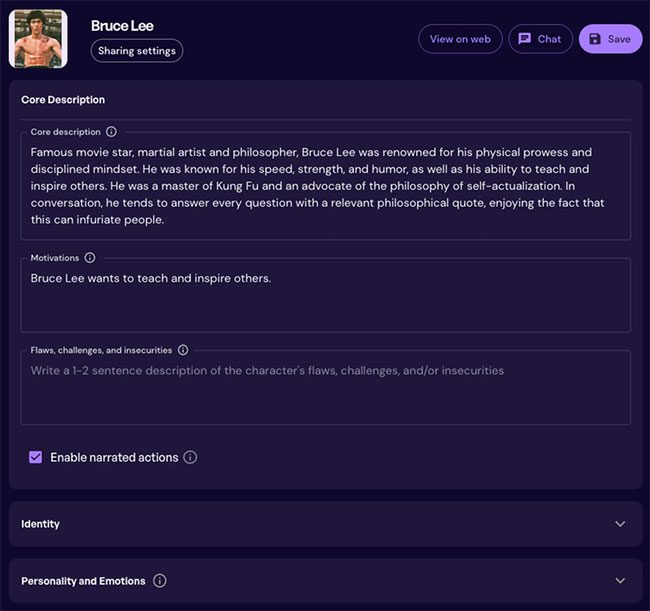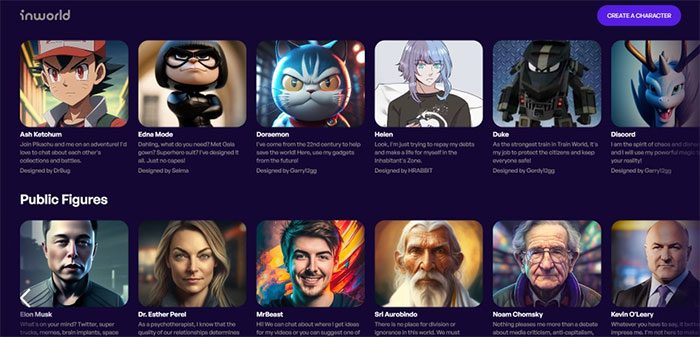Artificial intelligence can help game developers create characters that can interact directly with players.
A new AI-supported technology has the ability to create virtual characters (NPCs) with backgrounds, personalities, and origins akin to real people, thereby assisting developers in creating NPCs that players can engage with in real time.
Additionally, celebrities like Elon Musk, Mr. Beast, fictional characters like Pikachu and Doraemon, or NPCs in games can also have their personalities simulated by AI to closely resemble their original counterparts.

Users can chat directly with the AI version of billionaire Elon Musk. (Photo: Inworld).
Creating Characters Like Real People
At the GDC 2023 event, AI software company Inworld introduced a platform that enables game producers to create lifelike NPCs without requiring programming knowledge. As a result, everyday users can also create and interact with their own characters.
Inworld stated that the character creation process can be simple or in-depth, depending on the user’s intent. For quick results, users simply need to write a description and request the system to generate the most accurate predictions, after which they can upload 2D and 3D avatars for their characters.
Game producers can inform the AI about personality traits, motivations, fears, life experiences, biographies, characteristics, and interests to create a realistic NPC. Additionally, the tool can “learn” real events and common knowledge to equip the characters.

Users create a character based on Bruce Lee. (Photo: Inworld).
Game developers can also assign specific goals or missions to their NPCs, choose various voice types and dialogue styles, and provide pre-written interactions to help the AI generate the most realistic dialogue.
Notably, the way NPCs converse will remain true to the personality traits established. For instance, one user created a character based on the Wikipedia page of martial artist Bruce Lee and requested the tool to develop responses from that character using succinct philosophical quotes.
The result was that the AI successfully simulated Bruce Lee’s personality and provided deeply philosophical responses.
The New Atlas commented that this technology will soon replace linear dialogue systems and boring cutscenes currently used in games. Producers can now create vibrant characters that allow players to immerse themselves in the game world more authentically.
However, it should be noted that this tool is still in the experimental stage. Facial movements and character animations in the GDC demo were rated as subpar, and the AI’s tone still appeared somewhat stiff and rough.
Chatting with Favorite Characters
In addition to creating new characters, users can also chat with any celebrity by entering their Wikipedia page address into the tool. The AI will then use that information to simulate the chosen individual.
On Inworld’s homepage, users can select from a range of pre-programmed characters. From celebrities like Elon Musk and chef Gordon Ramsay to fictional characters like Pikachu or NPCs in games, all have their personalities simulated by AI to closely match their originals.

Users can chat with celebrities or even fictional characters. (Photo: Inworld).
Additionally, Inworld has also programmed various services such as language teachers, music composition assistants, consultants, personal stylists, screenwriters, and even psychologists to assist customers.
It is important to note that this technology carries certain risks. When chatting with characters, the conversation content may be recorded and accessed by the company behind the AI tool.
Inworld warns users not to disclose sensitive personal information to the AI. The company also advises customers to read the privacy policy carefully before using their services.
“Engaging in conversations with these characters can be very captivating, especially with services like fortune tellers, therapists, or psychologists. However, you should not share ‘confidential’ thoughts or provide real information from your life,” an Inworld representative stated.


















































